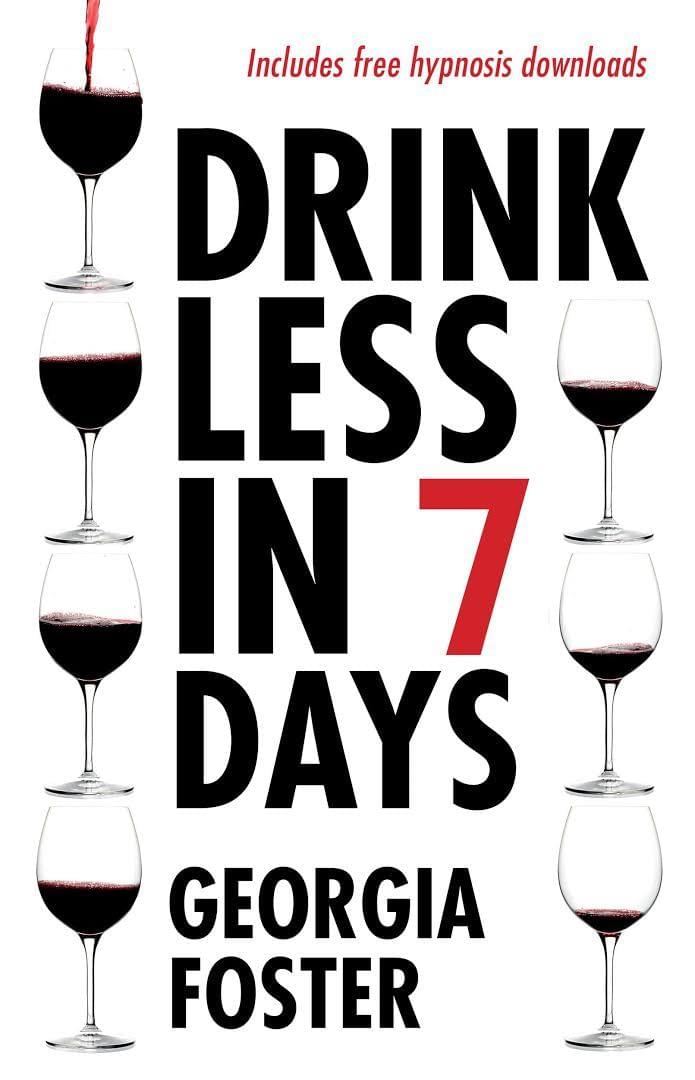profile/1212download1.jpeg
Abel
Best Methods On How To Reduce Alcohol Consumption In 7 Days
~1.9 mins read

WORRIED THAT YOU DRINK TOO MUCH?
WANT TO LEARN HOW TO MANAGE YOUR ALCOHOL RATHER THAN IT MANAGE YOU?
It might be that extra glass of wine once the kids have gone to bed, or the habitual tipple after work that you know is too much. You could be an 'all or nothing' drinker, or regularly drink more than you know is healthy for you but just can't seem to cut back.
It may seem impossible but there is light at the end of the tunnel. Drink Less in 7 Days Will get you off the drinking-too-much treadmill once and for all. In this positive and practical handbook, world-leading therapist and clinical hypnotherapist Georgia Foster offers an easily achievable way to reduce your alcohol intake — in iust seven days' Drink Less in 7 Days contains all the tools you need to change your drinking habits, and the powerful tried and tested drink less digital recordings that are included will re-train your brain so you can become a happier, healthier you.
CHANGE YOUR THINKING, CHANGE YOUR DRINKING.

Increased alcohol consumption in society today is rarely out of the news. But it seems that most therapies and therapists offer an all-or-nothing solution give up completely or give in to the drink. However, there is good news for those of us who would like to reduce our intake without giving up completely. Clinical hypnotherapist Georgia Foster offers us a middle way and even better, it takes just seven days!
Georgia is a world-leading therapist, specialising in over drinking behaviour (as well as anxiety and self-esteem and other issues). Her drink less courses have a high success rate (95% of attendees report reduced alcohol consumption) and in her new book she shares the secrets of this success.
Georgia uses short questionnaires and tick boxes to help the reader establish how they currently relate to alcohol and then gives simple, practical steps to help the reader take back control of their drinking.
WANT TO LEARN HOW TO MANAGE YOUR ALCOHOL RATHER THAN IT MANAGE YOU?
It might be that extra glass of wine once the kids have gone to bed, or the habitual tipple after work that you know is too much. You could be an 'all or nothing' drinker, or regularly drink more than you know is healthy for you but just can't seem to cut back.
It may seem impossible but there is light at the end of the tunnel. Drink Less in 7 Days Will get you off the drinking-too-much treadmill once and for all. In this positive and practical handbook, world-leading therapist and clinical hypnotherapist Georgia Foster offers an easily achievable way to reduce your alcohol intake — in iust seven days' Drink Less in 7 Days contains all the tools you need to change your drinking habits, and the powerful tried and tested drink less digital recordings that are included will re-train your brain so you can become a happier, healthier you.
CHANGE YOUR THINKING, CHANGE YOUR DRINKING.

Increased alcohol consumption in society today is rarely out of the news. But it seems that most therapies and therapists offer an all-or-nothing solution give up completely or give in to the drink. However, there is good news for those of us who would like to reduce our intake without giving up completely. Clinical hypnotherapist Georgia Foster offers us a middle way and even better, it takes just seven days!
Georgia is a world-leading therapist, specialising in over drinking behaviour (as well as anxiety and self-esteem and other issues). Her drink less courses have a high success rate (95% of attendees report reduced alcohol consumption) and in her new book she shares the secrets of this success.
Georgia uses short questionnaires and tick boxes to help the reader establish how they currently relate to alcohol and then gives simple, practical steps to help the reader take back control of their drinking.
profile/1212download1.jpeg
Abel

A Healthy Formula For Success
~1.4 mins read
The pleasure of eating a candy bar lasts but a few minutes. Burning off the calories it delivers can take nearly an hour. So this is definitely not a simple way to lose weight!
To lose one pound by exercising, you need to burn approximately 3,500 calories. It can take days of moderate exercise to do this. A better strategy for weight loss involves a two-pronged approach: exercising and cutting calories.
Although exercise by itself isn't the fast track to weight loss, it does offer important benefits beyond cancelling out calories. It slightly increases the rate at which you burn calories even when you're not working out. And pounds lost through boosting your activity level consist almost entirely of fat, not muscle.
Do the math for this simple way to lose weight
Start with this number: 3,500. That's how many calories are stored in a pound of body fat. With that number, you can tally up how much weight you can lose through increasing activity, cutting calories, or both.
Advertisement

Link socials
Matches
Loading...
